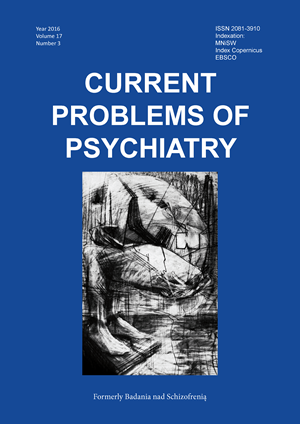Na granicy głębokiej duchowości i psychozy… Studium przypadku
DOI:
https://doi.org/10.1515/cpp-2016-0020Słowa kluczowe:
duchowość, religijność, zaburzenia psychiczne, schizofreniaAbstrakt
Niniejszy artykuł jest studium przypadku 28-letniego pacjenta z rozpoznaniem F23, studium poprzedzonym rozległym przeglądem piśmiennictwa, obrazującym sytuację życiową człowieka chorego, na której tle psychiatria miesza się ze sferą duchową i sferą sacrum. Celem autorów podejmujących ten temat było ukazanie wzajemnych relacji pomiędzy religią, duchowością i schizofrenią a także zwrócenie uwagi na złożone zagadnienie diagnozy różnicującej problemy religijne oraz duchowe. Kiedy wystarcza samo działanie specjalisty psychiatry a kiedy nieodzowna jest interwencja kapłana? Autorzy ukazują zagadnienienie zaburzenia psychicznego w powiązaniu z religijnością i duchowością w kontekście klinicznym, niezwykle istotny wydaje się bowiem zarówno proces diagnozowania jak i leczenia poszczególnych jednostek, uwzględniając ich cechy, światopogląd oraz system wartości i aspekty duchowe.Bibliografia
1. S. Grof, C. Grof, Spiritual Emergency. When Personal Transformation Becomes a Crisis, Los Angeles 1989, tylna strona okładki
2. A. Kępiński Schizofrenia PZWL Warszawa 1981 Wyd. IV
3. Religion, Spirituality, and Schizophrenia: A Review Sandeep Grover, Triveni Davuluri and Subho Chakrabarti, Indian Journal of Psychological Medicine Apr-Jun 2014, Department of Psychiatry, Post Graduate Institute of Medical Education and Research, Chandigarh, India.
4. D. Janus Psychopatologia a religia Eneteia Warszawa 2004 Wyd. pierwsze
5. Greenberg D., Brom D. Nocturnal hallucinations in ultra-orthodox Jewish Israeli men. Psychiatry. 2001;64:81-90
6. Peters E., Day S., McKenna J., Orbach G. Delusional ideation in religious and psychotic populations Br J Clin Psychol. 1999;38:83-96
7. J. Wciórka, S. Pużyński, J. Rybakowski Psychiatria tom3 Wyd. II Elsevier Wrocław 2012
8. M.Z. Stepulak Wybrane zagadnienia z psychologii pastoralnej. Wyższe Seminarium Duchowne Siedlce - Opole 2007
9. G. W. Allport Osobowość i religia, Instytut Wydawniczy Pax, Warszawa 1988
10. M. Olajossy Współpraca psychiatry i egzorcysty w: Pokonać szatana – egzorcysta czy psychiatra? JUT Wydawnictwo Szczebrzeszyn 2013
11. Koenig HG. Research on religion, spirituality, and mental health: a review. Can. J. Psychiatry 2009; 54: 283-291
12. J. Prusak Diagnoza różnicująca problemy religijne bądź duchowe – możliwości i ograniczenia kodu V 62.89 w DSM-5 Psychiatr. Pol. 2016; 50(1): 175-186
13. Diagnostic and statistical manual of mental disorders. Fifth edition. (DSM-5) Washington, DC: American Psychiatric Association; 2013
14. K. Dyga Pomiędzy Psychopatologią a Duchowością Instytut Psychologii Uniwersytetu Jagiellońskiego
15. Lalonde P. Schizophrenies. In: Lalonde PJ, Grundberg F, editors. Psychiatrie bio-psycho-sociale. Montreal: Gaetan Morin; 1999 pp. 242-85.
16. Takeyama M, Asai M, Hashimoto M, Bartels M, Kasper S. Transcultural study of schizophrenic delusions: Tokyo versus Vienna versus Tubingen (Germany) Psychopathology. 1998; 31; 59-68.
17. Tepper L, Rogers SA, Coleman EM, Malony HN. The pravalence of religious coping among persons with persistent mental illness Psychiatr Serv. 2001; 52: 660-665.
18. Huguelet P, Mohr S, Jung V, Gillieron C, Brandt PY, Borras L. Effect of religion on suicide attempts in outpatients with schizophrenia ir schizo-affective disorders compared with inpatients with non-psychotic disorders. Eur Psychiatry. 2007; 22: 188-194.
19. Napo F., Heinz A., Auckenthaler A. Explanatory models and concepts of West African Malian patients with psychotic symptoms. Eur Psychiatry. 2012; 27 (Suppl 2): S44-9
20. Johnson S., Sathyaseelan M, Charles H, Jeyaseelan V, Jacob KS. Insight, psychopathology, explanatory models and outcome of schizophrenia in India: A prospective 5-year cohort study. BMC Psychiatry. 2012;12:159
21. Philips R, Stein C. God's will, God's punishment, or God's limitations? Religious coping strategies reported by young adults living with serious mental illness. J Clin Psychol. 2007; 63: 529-40
22. Shah R, Kulhara P, Grover S, Kumar S, Malhorta R, Tyagi S. Contribution of spirituality to quality of life in patients with residual schizophrenia. Psychiatry Res. 2011: 190: 200-205.
23. Borras L., Khazaal Y, Khan R, Mohr S, Kaufmann YA, Zullino D et al. The relationship between addiction and religion and its possible implication for care. Subst Use Misuse. 2010; 45: 2357-410.
24. Pargament KI, Murray-Swank NA, Tarakeshwar N. An empirically-based rationale for aspirituality-integrated psychotherapy. Ment. Health Relig. Cult. 2005; 8(3): 155-165.
25. Norcross JC. red. Psychotherapy relationships that work. New York: Oxford University Press;
26. Nichole A, Murray-Swank NA, Pargament KI. God, where are you? Evaluating a spiritually-integrated intervention for sexual abuse. Ment. Health Relig. Cult. 2005; 8(3): 191-203.
27. Worthington EL, Kurusu TA, McCullough ME, Sandage SJ. Empirical research on religion and psychotherapeutic process and outcome – A 10-year review and research prospectus. Psychol. Bull. 1996; 119(3): 448-487.
28. Exline JJ, Rose E. Religious and spiritual struggles. W: Paloutzian RF, Park CL. red. Handbook of the psychology of religion and spirituality. New York: Guilford; 2005. s. 315-330.
29. Johnson C, Hayes J. Troubled Spirits: Prevalence and predictors of religious and spiritual concerns among university students and counseling center clients. J. Couns. Psychol. 2003; 50: 409-419
30. Lannert J. Resistance and countertransference issues with spiritual and religious clients. J.Humanist. Psychol. 1991; 31: 68-76.
31. Sanderson S, Vandenberg B, Paese P. Authentic religious experience or insanity? J. Clin. Psychol. 1999; 55: 607-616
32. Sperry L. Spirituality in clinical practice: incorporating the spiritual dimension in psychotherapy and counseling. Philadelphia, PA: Brunner-Routledge; 2001. s. 80-81.
33. Grzymała-Moszczyńska H. Religia a kultura. Wybrane zagadnienia z kulturowej psychologii religii. Kraków: Wydawnictwo Uniwersytetu Jagiellońskiego; 2004. s. 182-198.
Pobrania
Opublikowane
Numer
Dział
Licencja
Prawa autorskie (c) 2016 Autorzy

Praca jest udostępniana na licencji Creative Commons Attribution-NonCommercial-NoDerivatives 3.0 Unported License.


